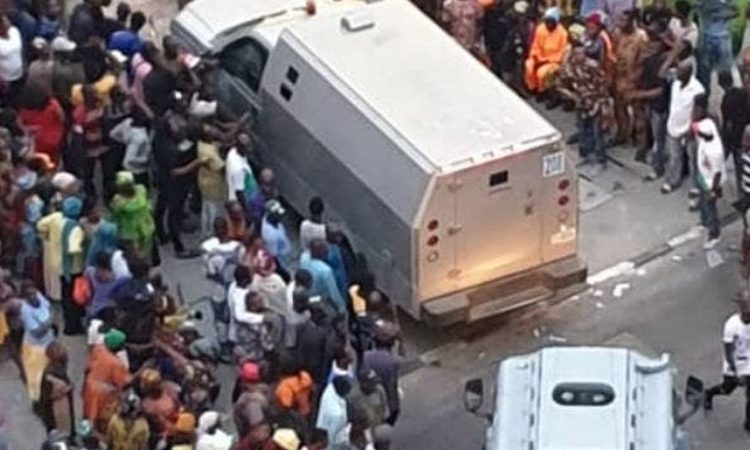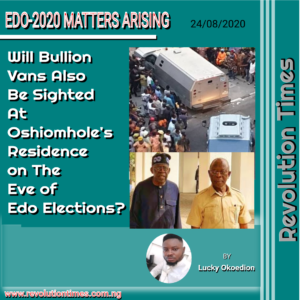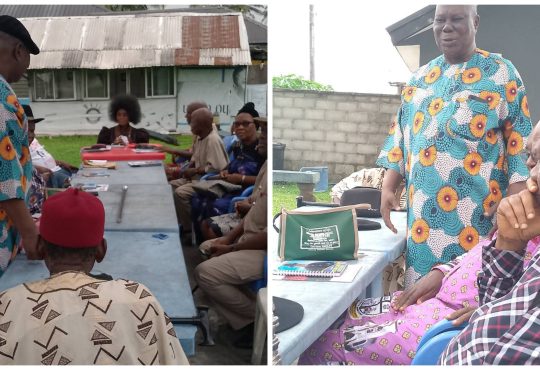Will Bullion Vans Also Be Sighted At Oshiomhole’s Residence on The Eve of Edo Elections?

By Lucky Okoedion
Given that the Edo-2020 elections is purportedly now a contest between an Oshiomhole who is a former governor of Edo state, who many consider as an aspiring political god-father and the incumbent Governor Godwin Obaseki, it bears resemblance with the Lagos-2019 elections that saw a Tinubu – former governor of Lagos State and one who many consider as an accomplished political godfather working against the re-election of Ambode the then incumbent Governor of the state who was seeking for a second term in office.

Most of the politics that have preceded the September 19, 2020 governorship polls of Edo State so far has had all the trappings of the Tinubu vs Ambode Lagos 2019 saga. However, many wonder if the major scandal – the Tinubu bullion vans scandal – that characterized the Lagos-2019 elections will also be repeated in Edo – whether Bullion Vans will also be seen entering Oshiomhole’s residence on the eve of Edo elections.
Bullion Vans are used to carry large sums of money that exceed the amount that individuals are permitted to carry in a country that has money-laundering laws like Nigeria. And it is not a pleasant sight for a crowd to gather in the home of a politician on the eve of an election and then Bullion vans are seen entering the residence at the same time. It is like being caught holding a smoking gun and standing next to a bullet-riddled corpse on a fresh crime scene. Hence, the world cannot be blamed for associating the “bullion van scandal” to vote buying which is a subset of a deadly political corruption called clientelism.
Clientelism is the exchange of goods and services for political support, often involving an implicit or explicit quid-pro-quo – it sometimes manifests itself as outright scandalous vote-buying. The kind we have heard of in Nigeria where sacks of money are brought to polling units, votes are negotiated and monies are shared to those who promise in return to vote for a particular candidate. The buyers of the vote allegedly go as far as also violating the secrecy of the polls by requiring the voters to show their voting slips after thumb-printing with ink. It is believed that election officers are also paid to look away and allow the electoral fraud to happen on their watch.
Many public affairs analysts have attributed the purported popularity and success of vote-buying in Nigeria to the concepts of “weaponized poverty” and “political illiteracy”. They argue that the growing poverty in Nigeria wrecks psychological damage on the populace by making it more difficult for them to resist the temptation to sell their votes. Other proponents of conspiracy theories are of the opinion that it is in the best interest of incompetent leaders for the people to remain poor and politically illiterate because such a population would be too busy worrying about what to eat and too feeble-minded to know that when the nation gets her politics and leadership right, the poverty would be a thing of the past. Hence the status quo persists.
A feature of clientelism in a society is that during elections, especially the eve before election day, there is a high circulation of cash. The big money politicians purportedly violate all money laundry laws in the land and begin to distribute money to their vote-buying agents who will in turn do the actual vote buying on the election day.
Adam Bassi Mohammed, a public affairs analyst has the following to say about the consequences of vote buying:
“Vote buying is rarely an isolated action, and it perpetuates corruption throughout the entire political system. When a candidate chooses to pay for support, rather than compete fairly for votes, they show a disregard for democratic norms and a willingness to use illegal means.
“Broadly speaking, vote buying obstructs the democratic process by interfering with the rights of citizens to freely decide who will represent them and their interests. This can result in the candidates with the deepest pockets winning the election, rather than candidates who would best serve their constituents. Ideally, elections create a “social contract” between candidates and constituents who voted with the presumption that the candidates will govern along the lines of their stated policy platforms.
“Vote buying enables poor governance and undercuts citizens’ ability to hold their elected officials accountable. If a candidate believes all they need to do to be elected is pay off voters and government officials, they will have no incentive to be responsive to issues their constituents care about issues like water and sanitation, education and unemployment.
“Along with damaging the candidate’s credibility, vote buying deters aspiring political leaders from running for office because it suggests that money, rather than ideas or experience, is how to win an election. That discourages qualified candidates from running for office, while entrenching corrupt officials in their positions. In places where vote buying is common, candidates face the dilemma
of needing to mobilize most of their resources to buy the votes and assuming office with significant debts from campaigning.
“According to international standards, in a true democracy every citizen has the right to stand for office, subject to reasonable restrictions. Vote buying makes it impossible to meet these standards by penalizing potential candidates who are at an economic disadvantage, especially women and minority politicians.”
Lucky Okoedion is a believer of a new Nigeria where true democracy and effective governance is practiced. He writes from Benin City. And can be reached on +2347038820118 .



